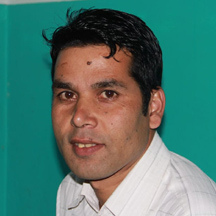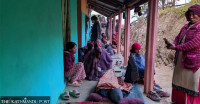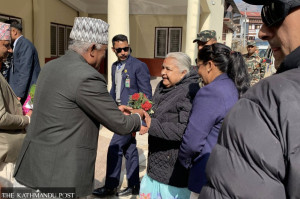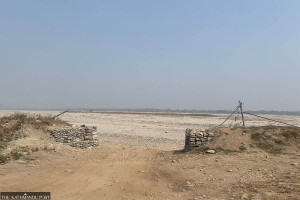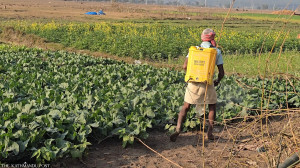Koshi Province
A majority of Ghunsa residents staying back in their villages this winter
Villagers from high-altitude settlements migrate to warmer areas during the winter but this year many are staying back because of the pandemic and a lack of income.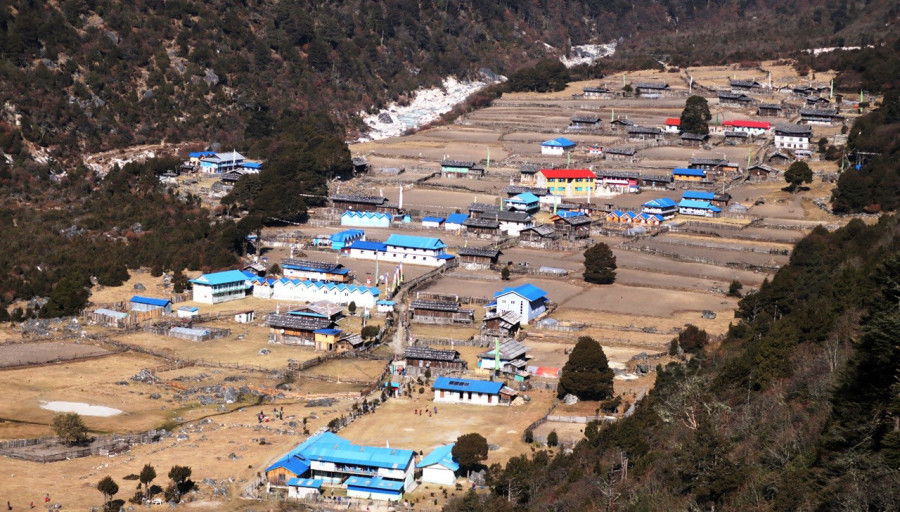
Ananda Gautam
Every year, Ghunsa residents migrate to warmer places to avoid the bitter cold during winter. But this year, around 75 percent of the total population have stayed back in their villages because of the Covid-19 pandemic and a lack of income.
Sonam Sherpa of Phaktanglung Rural Municipality Ward No. 7 in Ghunsa, Taplejung, is not leaving the village this year. In the previous years, he would go to Phungling, the district headquarters of Taplejung, or to Kathmandu to get away from the cold. But this year, he does not have the money to make the journey and to fund his stay in the cities.
“There's an economic crisis in every sector due to the pandemic and tourism was the worst-hit,” said Sonam Sherpa. “We will have to survive this winter somehow.”
The temperature in Ghunsa has been recorded between four to eight degree Celsius in the past few days, says Yangjom Sherpa, chairman of Ghunsa Foundation.
Ghunsa, a settlement that lies at an altitude of 3,100 metres, is a picturesque area that attracts many tourists. Tourists make their way to Kanchenjunga via Ghunsa, which allows the local population to earn their living through tourism. This year, however, there was no tourist footfall and the local people could not earn much.
“The temperature is dipping by the day. The streams have ice water and surviving the winter looks difficult,” said Pembaphuti Sherpa of Phaktanglung. She is also staying back in her village this year due to a shortage of funds. “We have had no income in the past year. Tourists did not come to Ghunsa due to the pandemic.”
Most families in Ghunsa run homestays and those who don’t rear chauris and yaks. “But this year, we haven’t been able to sell either our livestock or dairy products since Tiptala Bhanjyang, the border with China, has been closed amid Covid-19 fears,” said Pembaphuti.
Pemba Chhembel Lama, chief at the gumba in Ghunsa, reached Kathmandu a few days ago. Lama, who has five family members, has rented a room in Bouddha, Kathmandu. He is paying Rs 18,000 per month as rental for a one-bedroom flat.
“My family stays in Kathmandu for three to four months and the rest of the year we lock up the room. I plan to return to Ghunsa by mid-February since my brother is staying alone in the village,” he said. “I usually stay longer.”
Until four years ago, all the houses in Ghunsa would get padlocked from mid-December. But since the establishment of the Border Police Office in Ghunsa, some of the families stay back. Last winter, 12 families had stayed in Ghunsa.
“This year, 30 to 32 families have stayed back. So far, five houses have migrated to warmer areas; another three to four families are preparing to leave soon,” said Tansi Sherpa, a representative of the Kanchanjunga Conservation Area.
Currently, there are 46 families residing in Ghunsa.
According to the local residents, they have to spend at least Rs 200,000 to Rs 300,000 for a two-month stay outside of Ghunsa.
“When we migrate, we have to factor in house rent, food and other expenses. With no income this year, we couldn’t afford to move out of the village during the winter,” said Tashi Sherpa, a resident of Ghunsa.
Similarly, the local population of Mustang in Gandaki Province have decided to stay put in their villages due to Covid-19 fears. Most of them plan to spend the cold winter days preserving gumbas, chhorten and mani in the villages.
“Only those people who have houses in Pokhara and Kathmandu left the villages. All other villagers have stayed back this winter,” said Raju Bista, chairman of Loghekar Damodarkunda Rural Municipality.
Most residents of Mustang descend to the lower altitude for four months starting from November each year. But this winter, the global pandemic has made their yearly move infeasible.
“We used to descend to the lower altitude to avoid the cold and engage in mobile trading. We could not do so this year due to the coronavirus pandemic,” said Namgyal Gurung of Lomanthang Rural Municipality Ward No 5.
Ghanashyam Khadka in Myagdi contributed reporting.




 10.83°C Kathmandu
10.83°C Kathmandu